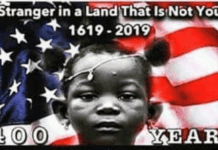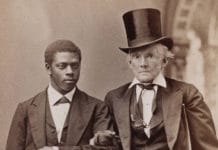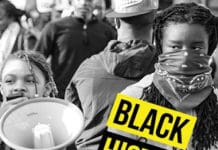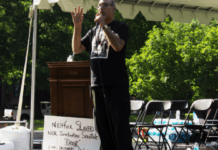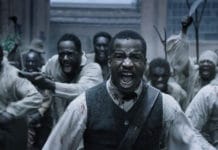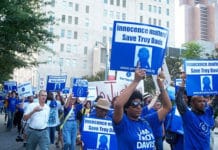by Ezrah Aharone
While “Django Unchained” is stirring controversy, Steven Spielberg’s movie, “Lincoln,” has unchained the legend of Lincoln to new mythic heights, without due challenge. Just as organizations like the NAACP denounced conservative-revisionist textbooks in Texas in 2010, they should denounce liberal-bent historical accounts that either ignorantly or deliberately fail to concede that “Abraham Lincoln did the right thing for the wrong reasons.” Or as Lerone Bennett aptly conveyed in the title of his book, Lincoln was in effect “Forced Into Glory.”

So what really happened with Lincoln and the Civil War? Considering the racism that abounds today, it’s inconceivable that 3 million Whites would fight gung-ho and 600,000 would unselfishly die for a “Black cause” way back 150 years ago. And if Lincoln factually wrote the Emancipation Proclamation to genuinely “free Africans” after two and a half centuries, its contents would seemingly be more etched into African-American minds. But if you ask around, it would be a near miracle to find anyone – Black academics and leaders included – who can even paraphrase any portion of it, much less clarify its contents. Isn’t that strange?
An unlikely but well-accredited vetting source of the legend of Lincoln is President Obama himself, who as a senator in a 2005 Time interview remarked: “I cannot swallow whole the view of Lincoln as ‘The Great Emancipator’ … I am fully aware of his limited views on race. Anyone who actually reads the Emancipation Proclamation knows it was more a ‘military document’ than a clarion call for justice. Scholars tell us too that Lincoln wasn’t immune from political considerations and that his temperament could be indecisive and morose.”
Neither due justice nor the ambiguousness of the real Lincoln can be condensed here, but his “racism” or “limited views on race,” as Obama diplomatically cites, is evidenced in a 1858 speech when he candidly said he was not “in favor of bringing about in any way the social and political equality of the white and black races … and I just as much as any other man am in favor of the superior position assigned to the white race.”
Examples of his “crudity” or not being “immune from political considerations,” as Obama intimates, is found in his letter to New York Tribune editor Horace Greely in August 1862 stating: “My paramount object in this struggle is to save the Union and is not either to save or to destroy slavery. If I could save the Union without freeing any slave I would do it, and if I could save it by freeing all the slaves I would do it; and if I could save it by freeing some and leaving others alone, I would also do that. What I do about slavery and the colored race, I do because I believe it helps to save the Union.”

In terms of the Emancipation Proclamation being a “military document,” Obama is corroborating Lincoln’s strategy to employ the document as a war measure to disrupt the South’s stability and slave economy – $4 billion in human capital alone in 1860s dollars – and offset the Fugitive Slave Act of 1850, which federally mandated that fugitive Africans be returned or abettors faced treason. It only “theoretically” freed Africans in Confederate states where he lacked enforcement.
Lastly, the moral notion that Lincoln waged the Civil War “to end slavery” is negated by his swift removal of Gen. John Fremont for “freeing Africans” in Missouri in 1861, expressing: “We didn’t go into the war to put down slavery, but to put the flag back … for I never should have had votes enough to send me here if the people had supposed I should try to use my power to upset slavery.”
In this microwave society with 10-second attention spans, fictional characters like Django are short-lived. But here to stay is the legend of Lincoln, who like many of his predecessors was gigantic in ambition but miniature in morality. Obama was diplomatic, but the open masquerading of Lincoln and the Emancipation Proclamation that he insinuates reflects a need for concerned Black people and institutions to converge and confront such distortions and profiteering that are unchained at our historical and ancestral expense.
Ezrah Aharone is an adjunct associate professor at Delaware State University and author of two acclaimed political books: “Sovereign Evolution: Manifest Destiny from Civil Rights to Sovereign Rights” (2009) and “Pawned Sovereignty: Sharpened Black Perspectives on Americanization, Africa, War and Reparations” (2003). He can be reached at Ezrah@EzrahSpeaks.com.

 Store
Store



